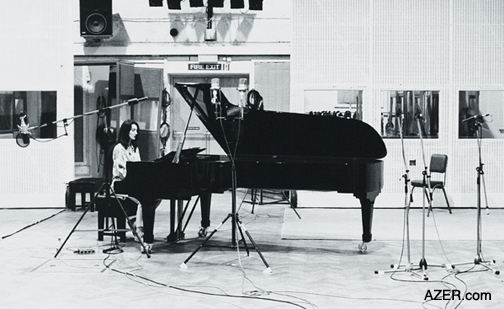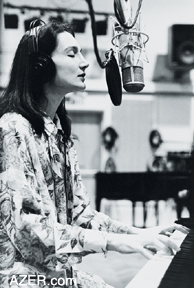|

Spring 2002 (10.1)
Pages
24-27
All Eyes On Aziza
Catching
up with Azerbaijan's Famous Jazz Artist
by Aziza with Betty Blair
Music samples
Related articles
1 Aziza Mustafa
Zadeh - Jazz, Mugam and Other Essentials of My Life - Aziza
Mustafa Zadeh with Betty Blair
2 The
Emergence of Jazz in Azerbaijan - Vagif Mustafazade: Fusing Jazz
with Mugham - Vagif Samadoghlu

No one is a victor in war; when nations
wage war, both sides always lose. Here we are, already in the
21st century. When I see all these things happening, I say to
myself, is it possible that we are human beings? We should be
able to find a different way to settle our differences. We are
so advanced technologically. But one simple thing eludes us:
how to live in peace. - Aziza
Say the name "Aziza",
and the words "Azerbaijan" and "jazz" automatically
come to mind for thousands of music fans around the world. In
concerts throughout Europe, Turkey and the Middle East, Aziza
Mustafa Zadeh has become popular for her unique blend of jazz,
classical music and traditional mugham, Azerbaijan's improvisational
modal music.
Aziza just released her sixth CD, called "Shamans",
on Decca Records in February 2002. On it, she continues to develop
her unique style, combining her classical training from the Conservatory
of Baku and her "scat singing," which sounds remarkably
like quavering Eastern vocal lines.
  Left: Aziza's sixth CD, called "Shamans",
was launched in February 2002. Left: Aziza's sixth CD, called "Shamans",
was launched in February 2002.
Jean-Hughes Allar, a vice president for her record company, said
about Aziza, "It's very rare that the world comes across
such a phenomenal talent, who combines world jazz and classical
influences without belonging to any genre specifically."
Aziza's honors have included
the Phono Academy Prize, Germany's most prestigious music award.
At age 18, she was a winner of the Thelonious Monk Institute
International Piano Competition in Washington, D.C. and performed
some of Monk's compositions in her own mugham-influenced style.
Azerbaijan International Editor Betty Blair interviewed Aziza
by phone at her home on February 14, 2002. Aziza lives in Germany
and records in both the United States and Europe. Her mother
Eliza, herself a classically trained singer from Georgia, is
deeply involved in advising her musically. Aziza's father, Vagif
Mustafazade, was an extraordinary pianist who helped start the
jazz movement in the Republic of Azerbaijan; he died tragically
at age 39 when Aziza was just a young child. Though Vagif never
had the opportunity to perform in the United States, his work
was known there.
Aziza is fond of quoting what "Dizzy" Gillespie, the
famous African American jazz trumpeter and bandleader said about
Vagif's music. Recognized as one of the greatest trumpeters in
jazz history, "Dizzy" heard Vagif's works played on
VOA (Voice of America) and observed: "Vagif was a genius
but it seems that he was born before his time. He brought us
the music of the future."
_____
My newest CD, "Shamans", is my first album under the
new contract with Decca. It was recorded at Abbey Road
Studios in London. In general, the CD is made up of my compositions,
my piano and vocals, and sometimes a little drums, which I also
perform. Decca. It was recorded at Abbey Road
Studios in London. In general, the CD is made up of my compositions,
my piano and vocals, and sometimes a little drums, which I also
perform.
The main piece, of course, is called "Shamans". It's
a capella - just vocals, no instruments except a little support
from percussion. "Endless Power" is about the spiritual
power of my father. "Strange Mood" is also dedicated
to my father. "Holiday Blessings" tries to express
that life is a great gift from God.
One of the improvisations on the CD is based on one of my favorite
mazurkas by Chopin. I also sing a piece by Bach in a kind of
scat style, which is my way of singing. I love Bach; so did my
father. He used to say that Bach was a super jazzman.
Spiritual Connection
Why did I name the CD "Shamans"? Shamans are very special
human beings, but not just because they can heal you physically.
There's a spiritual dimension to their work and for me, the spiritual
part of life is the most important.
I am somehow related to these types of healers on both sides
of my family: my great-grandmother on my mother's side, Maryam,
and on my father's side, my uncle Agha Mir Movsum, was revered
as a holy man [his shrine is in Shuvalan]. His great-grandfather
was the legendary figure At Agha [literally translated as "Mr.
Meat or Flesh" because his decalcified bones left him unable
to walk]. At Agha was a legendary seer whose shrine is in Buzovna,
a seacoast town on the Azerbaijan Peninsula.
  Left: Aziza while recording her new CD, "Shamans",
in London. Left: Aziza while recording her new CD, "Shamans",
in London.
Maryam was educated
as a medical doctor but she did much more for people than provide
physical treatment. She knew many secrets of healing and how
to fathom the nature of many illnesses.
And so on this CD entitled "Shamans" I want to remind
people that they should never forget about their spiritual side.
If we are aware of what we are doing, then we won't feel ashamed
later on about what we have accomplished. We should never lose
our sense of purpose, our dedication in life.
Memories of Father
I believe that death is only a biological phenomenon. Even though
my father has been gone for more than 20 years, his spirit is
with me when I perform. I feel it these days even more than I
did in the past. No matter what happens to me, I feel that he
is always there to help me. On the one hand, it is terribly sad
to realize that physically he isn't here any more. But on the
other hand, I know that he provides me with great help from heaven.
Losing my father as a child brought me so many unexplainable
feelings and emotions. Even after 20 years or more, this wound
has never been healed. It was a real disaster to lose such a
genius, especially when you know that he really was one.
How could he have died so young? How could it have happened?
It's not fair; it's not right. But the only thing I can do about
it now is to try to do my best in everything I do. When my father
looks down at me from heaven, I pray to God that he says that
he's proud of his daughter.
Being the daughter of Vagif is a great responsibility; I feel
like I have so much to do. But one thing that my father said
makes me feel confident. He told my mother that he knew he was
going to go [die] early. Often he said to her, "Oh Eliza,
I will go very soon. I don't have much time left."
And my mom would tell him: "I won't let you. You can't do
that."
And he would reply, "Well, when the time comes, Death will
not ask me or my wife. But don't worry, we've got Aziza, and
she will do what I would like her to do. I'm at ease because
we have our daughter." I was six or seven years old at the
time.
Today I feel his power, sometimes even physically. It's like
a crescendo in music - an amazing feeling. I feel it at certain
moments, maybe for less than a second. Suddenly it's like he's
sitting there in the room with me - in my piano room at home.
It's incredible. I'm thankful to God for such experiences.
And I'm such a lucky person to have my mother, Eliza. She gave
up her own career as a classical singer to dedicate herself to
nurturing my musical gifts. She was the only one my father ever
trusted. This is extremely important - musically, as a human
being and, of course, as a wife. They were such an ideal couple.
They were more than a couple - they were like two flowers growing
on a single stem. I feel very happy that I have such great support
from my mother.
I seem to have inherited my father's sensitive nature. Sometimes
I see things before they happen, for example, prior to the plane
crash when saxophone player Wayne Shorter's wife died in the
1990s, I had a dream where I saw the ocean and a lot of dead
people. Quite often I have such premonitions.
A few days before September 11, 2001 [when terrorist hijackers
crashed into the World Trade Center and the Pentagon], a strange
thing happened to me. I had a dream that showed the heavens,
but on the left side it was very dark. I took it to signify something
but I didn't know what it might be at the time. I remember waking
up; it was about 4 in the morning.
On September 11th, I suddenly found myself driving down the street
in the wrong direction. A lot of cars were going the other way
and people were shouting, "Hey, lady, what are you doing?"
Well, I'll admit I'm not the best driver anyway. And I said,
"I don't know how that happened. I got so confused."
This happened about 4 o'clock in the afternoon, which would have
been about 9 o'clock in the morning, just about the time that
the New York World Trade Center was being hit. Later my manager
called and said, "Did you hear what happened?"
I told him, "No, I just got home." I was still in shock
about driving down the street the wrong way. But then when I
heard about the attacks, I realized that I must have unconsciously
been affected by them.
It was painful to see what happened on September 11th, and it's
painful to see war going on in any country. No one wins in a
war; when nations wage war, both sides always lose. Here we are,
already in the 21st century. We should be able to find a different
way to settle our differences. When I see all these things happening
on television, I say to myself, is it possible that we are human
beings? We have so many privileges. We are so advanced technologically.
But one simple thing eludes us: how to live in peace.
I often say in my concerts: People, please love each other. It's
the most important thing in our lives - really. If we had respect
for each other, all of these problems would disappear.
I've been back to Azerbaijan two or three times since I've been
living in Germany. Of course, I can only stay for a short visit
- three or four days-and then I have to come back. But Azerbaijan
is my Motherland forever. It stays with me in my heart, and it
finds expression in my music.
Mostly during this interim since I've been away, I've spent most
of my time composing. I don't really labor over new compositions.
It seems they have a way of coming to me in my dreams when I'm
sleeping. I sleep and I have a dream. Often
I'm some place in the mountains surrounded by flowers. I'm very
much a lover of nature. I often see flowers and roses in my dreams.
Towering trees. Big mountains. Oh, it's my dream to live in such
a fairy-tale place. The truth is I'm a dreamer. Very romantic.
My music is really based on modal music - mughams. To me mugham
has its own magical power because it is really deep. It's really
philosophical music. It's much more than just music. It's religious.
It's poetry. It's life. And even my Western audiences who are
not so familiar with my style respond to it. Whenever we present
folk or classical folk music, people definitely feel it on a
very deep level. It's not necessary to be super-analytical or
theoretical. But emotionally and spiritually, you feel mugham
in your soul. Music is something so unique and so universal.
Essentially we are all the same, and emotionally, spiritually
we feel music in our souls.
I wish you love and peace - to you and your family as well. May
happiness and sunshine in its deepest sense fill your life.
____
Back to Index
AI 10.1 (Spring 2002)
AI Home
| Magazine
Choice
| Topics
| AI Store | Contact us
Other Web sites
created by Azerbaijan International
AZgallery.org | AZERI.org | HAJIBEYOV.com
|








